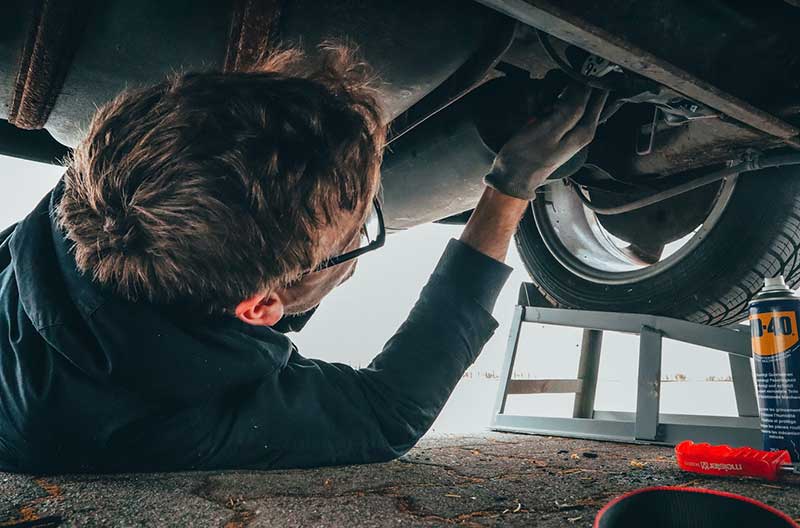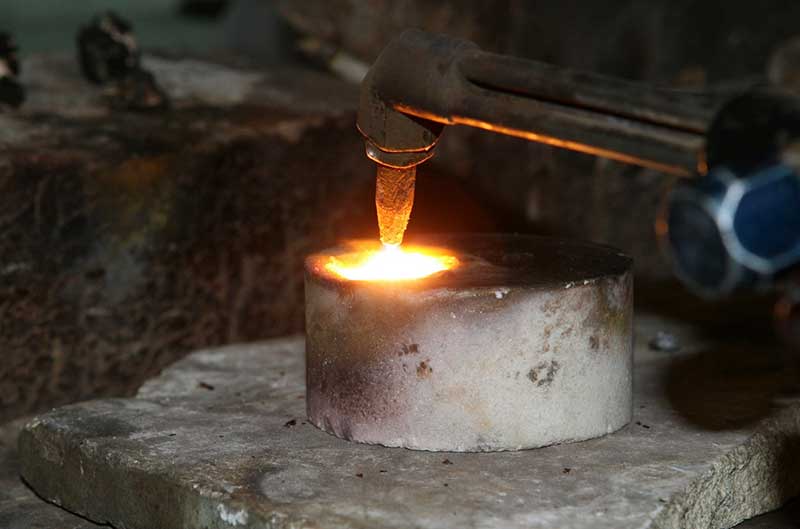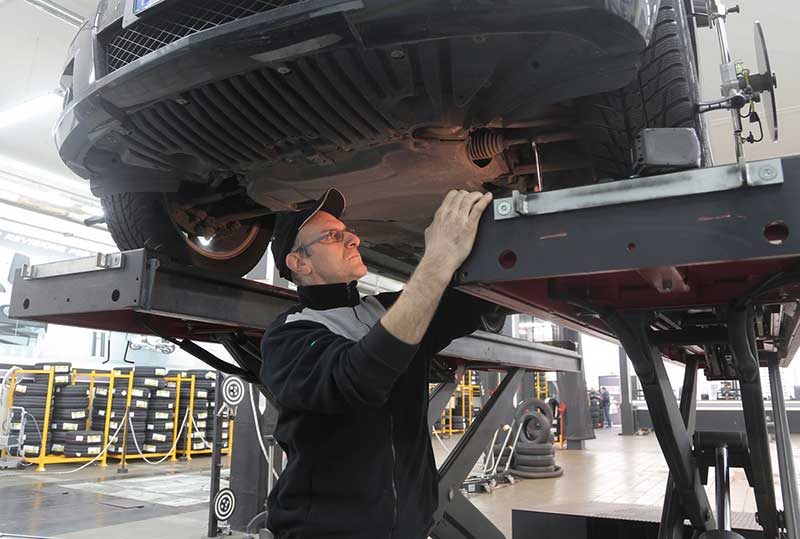Catalytic converters are often targeted by criminals.
According to the National Insurance Crime Bureau, around 14,433 catalytic converters were stolen in 2020, which was a 325% increase from the previous year. Today, these numbers continue to grow.
In this article, we find out what a catalytic converter is, why it’s become so popular to steal, and whether it’s covered by your car insurance.
What Is a Catalytic Converter?
A catalytic converter is a device that forms part of your car’s exhaust system. It’s used to convert toxic gases into less harmful gases.
This usually means converting carbon monoxide and nitrogen oxides into carbon dioxide, nitrogen, and water vapor.
Catalytic converters were invented by a French engineer, Eugene Houdry, who moved to the U.S. in 1930. When studies were released about smog in the Los Angeles area, he set out to create catalytic converters for gasoline engines.
This invention helped to significantly reduce smog in cities and the air quality drastically improved. Today, catalytic converters are still used in cars. They’re made out of precious metals such as platinum, palladium, and rhodium and they are attached to your car’s undercarriage.

Why Do Catalytic Converters Get Stolen So Often?
It’s clear that catalytic converters are popular among thieves. But what has made them such a target over the last couple of years? Let’s take a closer look at the reasons in the section below.
1. It’s made out of precious metals
When the first catalytic converters started being mass-produced during the 1970s, the precious metals that were used in them were reasonably inexpensive. However, this changed over the decades.
Today, rhodium is considered one of the rarest and most expensive metals. Instead of investing in gold and silver, wealthy investors are seeing it as a status symbol to invest in rhodium. In fact, rhodium is more than twice as valuable as gold.
On top of this, both platinum and palladium have increased in value. As of December 2022, they respectively sell for $1,037 per ounce and $1,976 per ounce.
If a criminal decides to steal your catalytic converter, they have a lot to gain. They can take it to a recycling yard and sell it for between $50 and $250.
But if you have a hybrid vehicle, the catalytic converter will contain more precious metals, which means that it can sell for up to $1,400.

2. It’s easy to reach
Catalytic converters are attached to the undercarriage of your vehicle. It’s a metal casing that’s about the size of a bread loaf, which is wedged between the exhaust system and near the engine.
With this placement, catalytic converter thieves can easily slide beneath your car, undo its grip with pliers, and hurry away before anyone notices.
This is in contrast to parts that are hidden beneath your car’s hood, which would be more complicated to reach as well as put thieves in the public spotlight.
3. It doesn’t always trigger an alarm
Car alarms have a range of sensors in strategic places, such as door sensors and hood sensors. When they’re triggered by any nearby motion, such as your car being bumped by a criminal who’s trying to break in, your alarm goes off.
In some cases, alarm sensors are extremely sensitive and they may as a result be repeatedly triggered by noncriminal activity, such as a large truck passing nearby.
The solution to this is to turn down the sensitivity so that the alarm only goes off when there’s noteworthy activity around your car.
However, if the sensitivity is turned down too much, criminals may be able to access your car undetected and for example, steal your catalytic converter.
They may even deliberately set your alarm off often so that you’re baited into turning down your alarm’s sensitivity.
4. It’s difficult to track stolen converters
Catalytic converters don’t have any identifying marks, such as serial numbers. This means that once they’ve been sold to scrap yards or recycling plants, it’s impossible to prove where they came from.
Even if police can track it down, they won’t be able to confirm without a doubt that it originally belonged to you. As a result, they won’t be able to retrieve it from the person or organization it was sold to.
5. It’s quick and easy to steal
Criminals only need five to ten minutes to steal a catalytic converter. They can unbolt it from your vehicle, or they can use a battery-operated saw to cut the connecting pipes.
To speed up the process, criminals select vehicles that are designed with higher ground clearance than others, such as SUVs and trucks. This allows them to immediately undo the catalytic converter rather than first having to use a jack to lift your car.
Key Point: These Cars Are Most at Risk for Catalytic Converter Theft
|
How to Tell When Your Catalytic Converter Is Stolen
Since your catalytic converter is housed beneath your car, you won’t immediately realize that it’s been stolen. Instead, you will notice that it’s gone in the following ways:
- Your car makes a roaring sound when you start the engine. This will be noticeably louder than usual, so you won’t miss it.
- Your “check engine” light will flicker on if there’s something wrong with your catalytic converter or if it’s been removed altogether. Look out for code P0420.
- You may notice a chemical odor coming from your car, or clouds of dark smoke leaving your exhaust pipe.
- You won’t gain speed the way you’re used to. Your car will struggle to accelerate, and it may feel as though you’re dragging a trailer behind you.
- Your vehicle could show signs of overheating, which may put your engine in jeopardy since it might get blown.
On top of this if you’re observant you might notice evidence of your catalytic converter’s removal, such as suspicious scraps of metal lying around your car.
How Much Will a New Catalytic Converter Cost?
Besides the theft damaging your car, it’s also illegal to drive around without a catalytic converter. This is because it leads to excess toxic gases, which reduces air quality in public spaces. Therefore, you should make an effort to replace it as soon as possible.
A new catalytic converter will cost you between $1,000 and $3,000. However, the final amount that you’re charged will depend on the state you’re in, as well as the make and model of your car.
Let’s say you have a Ford F-150, which is a pickup truck that criminals can easily target. If they manage to remove the converter while you’re shopping at your local mall, you can expect to pay between $1,420 and $1,445 to have it replaced.
On top of this, you will also have to pay for the labor to install it, which will set you back between $95 to $120.
Does Car Insurance Cover Catalytic Converter Theft?
Replacing your catalytic converter may drain your emergency fund—and even dig into your hard-earned savings. The best way to get ahead of such an unexpected event is to make sure your car is insured.
Basic car insurance, otherwise known as liability coverage, is a requirement to drive on U.S. soil.
However, this only protects third parties if you’re involved in an accident. For example, if your brakes fail and you drive into a shop, it will cover the cost of the damage to the store, as well as the owner’s medical bills.
Liability cover doesn’t assist with anything else, such as a stolen catalytic converter. To have your converter covered, you’ll need to take out comprehensive insurance on top of your liability coverage.
Comprehensive car insurance will assist you to cover costs related to unexpected events like theft of car parts or hail damage, but it excludes accidents with other cars or objects. In these instances, you will need collision coverage.
Key Point: What Is Collision Coverage? Collision coverage is a kind of car insurance that will help you pay for repairs to your vehicle if it’s damaged in an accident with another car or object. |
Additionally, comprehensive coverage will step in if your vehicle is, for example, damaged by natural disasters, fires, explosions, falling objects, or theft.
Let us return to the above example where your Ford F-150 had its catalytic converter stolen.
Instead of paying out of pocket, your comprehensive insurance will kick in. However, before this can happen, you need to settle your annual deductible. This is usually between $100 and $2,000 each year.
Let’s assume that your deductible is $200, and it costs you $1,420 for the part and $95 for the mechanic’s labor which equals $1,515.
When you claim from your insurance, you’ll first need to pay the $200 deductible, and the insurance company will then pay the remainder of the bill ($1,515 minus $200 equals $1,315).
To replace your catalytic converter, your cost is then reduced from $1,515 to $200. At the same time, you will also remain covered for any other noncollision emergency.

Five Steps to Follow If Your Catalytic Converter Is Stolen
If you start your engine and you’re shocked by the sound it’s making, your catalytic converter may have been removed. You should follow these steps to address the problem:
- Confirm that it’s gone: If you’re in a safe area, get down on the ground and physically check whether your converter is still there.
- If it isn’t there, call the police: If you believe it’s been stolen, call your local authorities and report the incident. You will need a case number to claim from your insurance.
- Reach out to your insurer: If you have comprehensive coverage, your insurer will be able to tell you what to do next. This often involves getting quotes from local mechanics or making use of one approved by your insurance company.
- Go to the mechanic’s workshop: Although you might be able to install the new catalytic converter yourself, it’s a lot less complicated to have a professional deal with it.
- File your insurance claim: Once the job has been done, you can pay your deductible and claim the remaining amount from your insurer.
Are There Ways to Prevent Catalytic Converter Theft?
The Preventing Auto Recycling Theft (PART) Act, which was implemented at the start of 2022, attempts to reduce catalytic converter theft.
This Act will, among other things, require new cars to have serial numbers on their converters, and scrapyard dealers will have to keep detailed records of purchases.
Besides relying on the PART Act, you can also take steps to prevent your catalytic converter from being stolen. This may include the following:
- Installing an anti-theft device or a catalytic converter protection device.
- Volunteering to have a serial number engraved on it.
- Making it difficult for criminals by parking indoors or in well-lit areas.
- Parking within view of a CCTV camera.
- Consider installing a dashboard camera.
Ready to Insure Your Vehicle? Get a Car Insurance Quote from CheapInsurance.com
Unfortunately, you cannot completely prevent your catalytic converter from being stolen. Despite your best efforts, a criminal may still get away with it.
This means that it’s in your best interest to make sure you have the correct insurance in place to protect you against having to pay expensive bills following catalytic converter theft.
If you don’t have comprehensive coverage, or you’re unhappy with your current insurance policy, fill in your zip code at the top of this page to get instant quotes.
You will be able to compare quotes from a range of different auto insurance providers and find one that fits your budget and preference.


